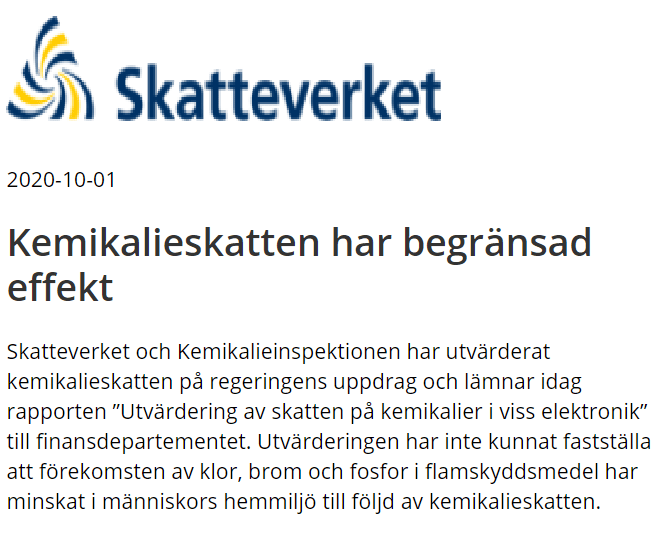
The official report evaluating the Swedish chemicals tax finds no evidence it is effective and confirms identified problems. The tax was introduced in July 2017 on most electrical and electronic goods sold in Sweden (white goods, specific electronics such as computers, displays, TV), with tax reductions possible if certain types of flame retardant are not used.
The evaluation of the tax by the Swedish Government Chemical Agency KEMI and the Swedish Tax Agency concludes that most electrical goods retailers have not changed their policy, that it is difficult to distinguish effects of the tax from other chemical regulations, and that it is not possible, to date, “to establish that the presence of chlorine, bromine and phosphorus in flame retardants has decreased in people’s home environment as a result of the tax”.
The agencies’ report says that the tax is “not cost-effective”, has increased prices for consumers, is administratively burdensome for companies. It suggests that the chemical substance should be taxed, not as at present the weight of the product, and that the references to “additive” FRs should be clarified. The agencies conclude “there is reason to review the tax structure regarding the groups of substances taxed. … The group containing phosphorus and the group of alternative flame retardants are less uniform and contain substances that show great variation in terms of hazard properties.”
The Swedish Tax Agency has published the report under the title “The chemical tax has limited effect”. Since its announcement and implementation, the tax is criticised by stakeholders, ranging from the electronics industry to NGOs, e.g. IT&Telekomföretagen, TCO Development ecolabel, Hewlett Packard (pinfa Newsletter n°106), ChemSec (n°101), and a recent study by Chalmers Technical University (n°117). KEMI and Skatteverket will now prepare a second study to propose changes to the current ecotax by march 2021.Swedish tax Agency (Skatteverket) publication of the report “Evaluation of the tax on chemicals in certain electronics”, report Fi2019 / 04008 / S2, 1st October 2020 https://www.skatteverket.se/omoss/press/nyheter/2020/nyheter/kemikalieskattenharbegransadeffekt.5.569165a01749e7ae789e31.html?fbclid=Iw%E2%80%A6
Comment on IT&Telekomföretagen website https://www.itot.se/2020/10/kemikalieskattens-vara-eller-icke-vara/